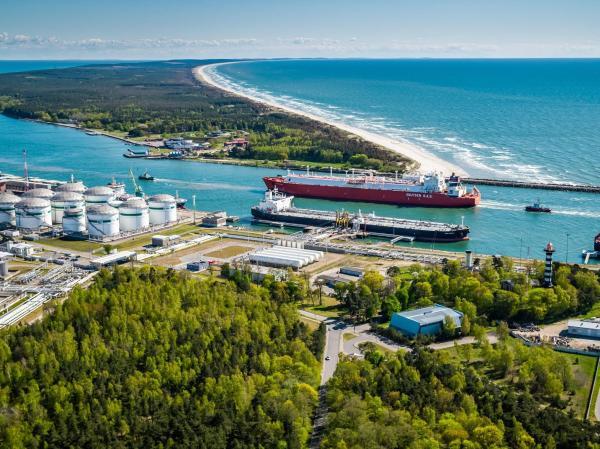
- EUR 6.1 billion new financing for climate action, business, health and education
- EUR 2.5 billion for COVID economic reliance and business financing
- EUR 2.2 billion for climate action, clean transport and renewable energy
- EUR 1.1 billion for health and education
The Board of Directors of the European Investment Bank (EIB) today decided to accelerate targeted support for global climate adaptation and cohesion investment across Europe. It also approved a framework which calls for the respect by EU Bank financing beneficiaries to align with objectives of the Paris Agreement on climate, which aims at containing global warming under 1.5 C°.
“Three weeks from today world leaders will gather in Glasgow for the COP26 climate summit to help avert the catastrophic threat of global warming and save our planet. As the EU climate bank the EIB is stepping up its engagement and accelerating investment to protect communities from extreme weather, such as flood and forest fires, and helping large polluters cut carbon emissions. Today the EIB backed transformational climate action and COVID resilience projects across Europe and around the world that will create opportunities and build a better and greener future,” said Werner Hoyer, President of the EIB.
The Board approved EUR 6.1 billion of new financing for 28 projects to strengthen economic resilience to the COVID-19 pandemic, support climate action and enhance public health and education.
Strengthening EIB’s climate adaptation impact and cutting emissions
Ahead of the UN climate talks in Glasgow, the EIB Board of Directors today approved new detailed plans to accelerate protection for key infrastructure from a changing climate and helping large emitters to cut overall emissions, two key deliverables under the EIB Group Climate Bank Roadmap.
The EIB’s first dedicated Adaptation Plan will strengthen investment and technical support to protect projects from the impact of more extreme weather and increase climate resilience of existing and new infrastructure. Under the new Adaptation Plan, to be launched in Glasgow, the EIB will significantly increase adaptation financing to support the European Union Adaptation Strategy for smarter, more systemic and faster adaptation, both across Europe and globally.
Under the Paris Alignment for Counterparties framework, the EIB is the first multilateral bank to consider not just the climate impact of the projects it finances, but also the wider activity of borrowers. The framework will ensure both that projects financed by the EIB are Paris aligned, and that the counterpart is taking steps towards decarbonizing business activity and strengthening resilience to climate change.
Under the new initiative the EIB will offer technical support to higher emitting corporate borrowers and financial intermediaries to help them meet the goals of the Paris Agreement and deliver a more sustainable future.
Increasing climate and innovation impact in Cohesion Regions
The EIB today also approved a new framework for its cohesion action for the period 2021-2027 and agreed that a mid-term review will take place in 2023.
By 2025, 45% of total EIB financing in the European Union financing will support projects in cohesion regions and 23% will back investment in Europe’s less developed regions. These are defined as where the GDP per inhabitant is less than 75 % of the EU average.
The EIB further committed to increase overall support for innovation and private sector development in these regions.
EUR 2.5 billion for COVID economic reliance and business financing
New investment by thousands of entrepreneurs and companies across Europe will be supported by EUR 2.5 billion of new private sector financing approved by the EIB today.
This includes EUR 1.75 billion of new backing for targeted credit lines to support investment by firms in sectors most impacted by COVID-19 to be managed by financing partners in France, Italy and Spain alongside pan-European small business financing under the European Guarantee Fund.
EUR 2.2 billion for climate action, clean transport and renewable energy
The EIB agreed to support new investment to increase renewable energy generation in Austria, France, Spain, Portugal and North Africa. Water supply to 300 towns in southern Germany will also be secured by new EIB backed climate adaptation investment.
The EIB also approved financing to expand the use of electric vehicles by businesses across Italy, upgrade the Port of Klaipeda in Lithuania and acquire more than 700 new rail freight wagons for use across Europe that will provide an alternative to road use.
EIB backing for construction of the new Neuconnect and Greenlink interconnectors between Germany and the UK, and the UK and Ireland was also confirmed.
EUR 1.1 billion for health and education
Public health in Romania, the Netherlands, Sweden and Finland will benefit from EIB support for a new regional hospital in Craiova, upgrading regional healthcare around Leiden and enhancing local health services across the two Nordic countries.
The EIB also agreed to support emergency response to COVID-19 in Bangladesh and enhancing pandemic preparedness.
Students across Hungary will benefit from a new student loan programme backed by the EIB and schools in the greater Paris region will be upgraded under a new EIB supported financing programme.

©2021, People's Republic of Bangladesh
Download original

©2021, People's Republic of Bangladesh
Download original

©2021, CD94_Eric Legrand
Download original

©2021, Spital Regional de Urgență în Craiova
Download original

©2021, Spital Regional de Urgență în Craiova
Download original

©2021, Klaipeda State Seaport Authority
Download original

©2021, Klaipeda State Seaport Authority
Download original

©2021, Klaipeda State Seaport Authority
Download original

©2021, CD94_Eric Legrand
Download original

©PKP Intercity S.A.
Download original

©PKP Intercity S.A.
Download original